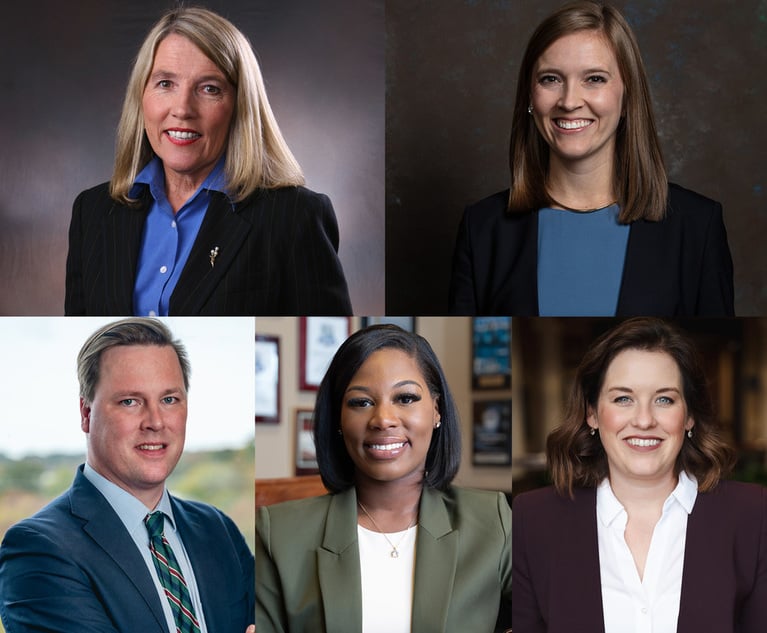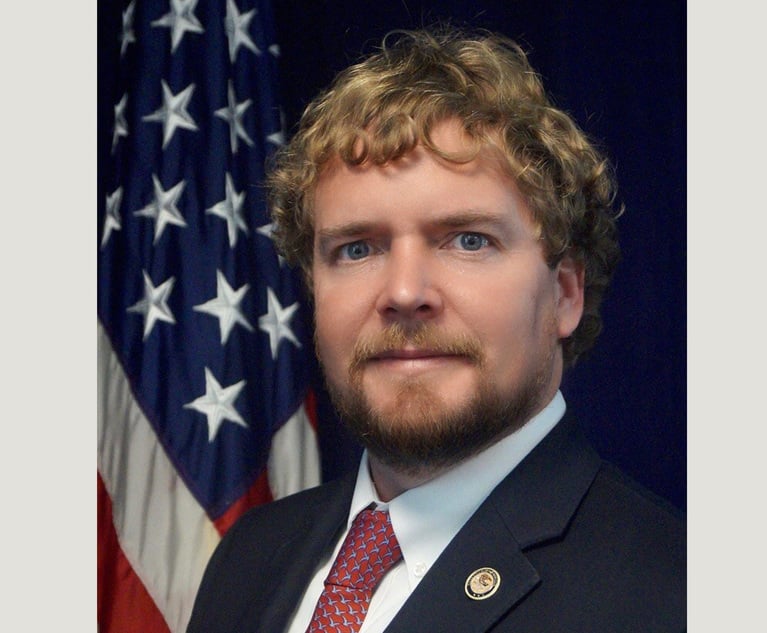Lack of Free Speech 'Shot Clock' Dooms School Board's Public Comments Policy
It was an opinion easily understood by any Tar Heel lawyer who knows the sky is really Carolina blue.“Control the clock, and you control the game,”…
October 05, 2017 at 03:10 PM
5 minute read
It was an opinion easily understood by any Tar Heel lawyer who knows the sky is really Carolina blue.
“Control the clock, and you control the game,” Judge Robin Rosenbaum began a ruling handed down this week in a Georgia free speech case by the U.S. Court of Appeals for the Eleventh Circuit.
Dean Smith, legendary basketball coach at the University of North Carolina, was famous for the Four Corners offense which led to the creation of basketball's shot clock, wrote Rosenbaum, a Chapel Hill native.
The coach's strategy apparently was not lost on the Walker County school board in LaFayette, Georgia, Rosenbaum observed. In order to publicly address the board, a member of the public has to go through a multistep process that must be competed at least a week before the board meeting at which a citizen wants to speak.
But, Rosenbaum said, the board “completely controls the timing of a step at the beginning of the process. If the board drags its feet in completing this step, a member of the public cannot finish the rest of the steps in time to be permitted to speak.”
In 2015, Jim Barrett, a Walker County public schoolteacher and president of the Walker County Association of Educators, challenged the board's public comment policy as unconstitutional. Last year, U.S. District Judge Harold Murphy agreed, issuing a permanent injunction enjoining its enforcement. The school board appealed.
Writing for a panel that included Judge Julie Carnes and Senior Judge Ronald Gilman of the Sixth Circuit Court of Appeals, Rosenbaum affirmed Murphy's finding that the Walker school board's public comments policy gave Superintendent Damon Raines unconstitutional “unbridled discretion” in deciding who could publicly address the board. Because Raines had no time limit—a form of free speech shot clock—on when he had to decide on a public comments request, the public comments policy was unconstitutional on its face, she said.
“It's what we wanted to have happen,” said Barrett's counsel, Atlanta civil rights attorney Gerry Weber, who has litigated the case with Decatur attorney Craig Goodmark.
The Walker County school district was defended by a team of attorneys from Atlanta's Ford & Harrison; LaFayette's Womack, Gottlieb & Rodham; and Gregory, Doyle, Calhoun & Rogers in Marietta. Attorneys from all three firms could not immediately be reached for comment.
Rosenbaum's opinion held that the school board policy was constitutionally suspect in more ways than one. It also constituted unconstitutional prior restraint, Rosenbaum said. “True, the policy does not expressly confer on the superintendent the right to grant or deny a request to speak. But the policy also does not provide that any individual who seeks permission necessarily gets it,” she said.
“The board grants only selective access to speakers: only those speakers who satisfy the policy's substantive and procedural criteria may speak. … The comment sessions are open to the public, but they are not open to the public at large for discussion of any and all topics,” she said.
Rosenbaum also said that certain policy prerequisites were also unconstitutionally content-based. “The policy's requirement that potential speakers schedule an initial meeting with the superintendent is content based because it poses enough of a risk that speech will be chilled or effectively censored on the basis of content or viewpoint,” she said. “And because the initial-meeting provision lacks any time limit with which the superintendent must comply, the requirement is unconstitutional.”
Barrett, she concluded, suffered an irreparable injury. “His right to speak at the February 17 meeting was violated and his right to speak at future meetings was chilled and could be prevented altogether under the policy.”
In a separate concurrence on the policy's unconstitutionality, Carnes took issue with the majority position that the school board's public comments policy constituted prior restraint and unconstitutionally governed content, calling them “misplaced” because school board meetings, although public, are limited open forums.
At limited public forums, such as school board meetings, the public does not have an absolute, unfettered right to speak because the meeting's primary purpose is to conduct business, Carnes argued. So a public comments policy may include “reasonable” speech restrictions, she said.
Carnes also said that, while a government may not limit public comments because of a particular viewpoint, it may “designate the specific topics that can be discussed in the forum it has created.”
“I agree that the policy is invalid…because by giving the superintendent carte blanche to deny a speaker an opportunity to speak—simply by delaying the preliminary meeting that is a prerequisite for that opportunity—the policy allows the superintendent to discriminate based on the viewpoint of the intended speaker,” Carnes said. “But to repeat, I find the panel opinion's focus on the absence of content-neutrality in the policy to be misplaced in what is clearly a limited public forum context.”
This content has been archived. It is available through our partners, LexisNexis® and Bloomberg Law.
To view this content, please continue to their sites.
Not a Lexis Subscriber?
Subscribe Now
Not a Bloomberg Law Subscriber?
Subscribe Now
NOT FOR REPRINT
© 2025 ALM Global, LLC, All Rights Reserved. Request academic re-use from www.copyright.com. All other uses, submit a request to [email protected]. For more information visit Asset & Logo Licensing.
You Might Like
View All
'Didn't Notice Patient Wasn't Breathing': $13.7M Verdict Against Anesthesiologists
12 minute read

Trending Stories
- 1Kirkland Is Entering a New Market. Will Its Rates Get a Warm Welcome?
- 2African Law Firm Investigated Over ‘AI-Generated’ Case References
- 3Gen AI and Associate Legal Writing: Davis Wright Tremaine's New Training Model
- 4Departing Attorneys Sue Their Former Law Firm
- 5Pa. High Court: Concrete Proof Not Needed to Weigh Grounds for Preliminary Injunction Order
Who Got The Work
J. Brugh Lower of Gibbons has entered an appearance for industrial equipment supplier Devco Corporation in a pending trademark infringement lawsuit. The suit, accusing the defendant of selling knock-off Graco products, was filed Dec. 18 in New Jersey District Court by Rivkin Radler on behalf of Graco Inc. and Graco Minnesota. The case, assigned to U.S. District Judge Zahid N. Quraishi, is 3:24-cv-11294, Graco Inc. et al v. Devco Corporation.
Who Got The Work
Rebecca Maller-Stein and Kent A. Yalowitz of Arnold & Porter Kaye Scholer have entered their appearances for Hanaco Venture Capital and its executives, Lior Prosor and David Frankel, in a pending securities lawsuit. The action, filed on Dec. 24 in New York Southern District Court by Zell, Aron & Co. on behalf of Goldeneye Advisors, accuses the defendants of negligently and fraudulently managing the plaintiff's $1 million investment. The case, assigned to U.S. District Judge Vernon S. Broderick, is 1:24-cv-09918, Goldeneye Advisors, LLC v. Hanaco Venture Capital, Ltd. et al.
Who Got The Work
Attorneys from A&O Shearman has stepped in as defense counsel for Toronto-Dominion Bank and other defendants in a pending securities class action. The suit, filed Dec. 11 in New York Southern District Court by Bleichmar Fonti & Auld, accuses the defendants of concealing the bank's 'pervasive' deficiencies in regards to its compliance with the Bank Secrecy Act and the quality of its anti-money laundering controls. The case, assigned to U.S. District Judge Arun Subramanian, is 1:24-cv-09445, Gonzalez v. The Toronto-Dominion Bank et al.
Who Got The Work
Crown Castle International, a Pennsylvania company providing shared communications infrastructure, has turned to Luke D. Wolf of Gordon Rees Scully Mansukhani to fend off a pending breach-of-contract lawsuit. The court action, filed Nov. 25 in Michigan Eastern District Court by Hooper Hathaway PC on behalf of The Town Residences LLC, accuses Crown Castle of failing to transfer approximately $30,000 in utility payments from T-Mobile in breach of a roof-top lease and assignment agreement. The case, assigned to U.S. District Judge Susan K. Declercq, is 2:24-cv-13131, The Town Residences LLC v. T-Mobile US, Inc. et al.
Who Got The Work
Wilfred P. Coronato and Daniel M. Schwartz of McCarter & English have stepped in as defense counsel to Electrolux Home Products Inc. in a pending product liability lawsuit. The court action, filed Nov. 26 in New York Eastern District Court by Poulos Lopiccolo PC and Nagel Rice LLP on behalf of David Stern, alleges that the defendant's refrigerators’ drawers and shelving repeatedly break and fall apart within months after purchase. The case, assigned to U.S. District Judge Joan M. Azrack, is 2:24-cv-08204, Stern v. Electrolux Home Products, Inc.
Featured Firms
Law Offices of Gary Martin Hays & Associates, P.C.
(470) 294-1674
Law Offices of Mark E. Salomone
(857) 444-6468
Smith & Hassler
(713) 739-1250







